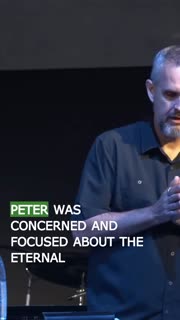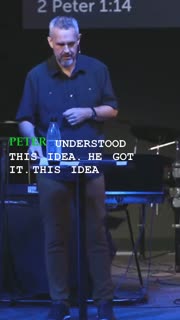Growing in Faith: An Eternal Perspective on Discipleship
Devotional
Sermon Summary
Bible Study Guide
Sermon Clips
### Quotes for outreach
1. "What if the greatest impact, the most significant legacy we have, is an eternal one because of the way we were obedient to Jesus and loved and served and invested in our families and those around us? What if the person that we invest in and disciple goes on to invest in and disciple someone else, who goes on to invest in and disciple someone else, who goes on to make a global impact for the gospel?" [29:51] (34 seconds)
2. "What if we got up on a Sunday morning and instead of considering whether or not we feel like going to church or what we hope to get out of church, whatever that means, we consider how we may possibly be used by Jesus to encourage or empathize, to support or pray for or just be there for someone else who really needs it that morning. What if the focus was not on ourselves?" [32:32] (37 seconds)
3. "Think about it. There's never been a time in history where the word of God has been more available to more people than right now. I don't carry a phone when I'm on platform. But my phone, my Bible app, has over 70 English translations of the Bible that are instantly available to me. And that's just in one app and in English." [39:36] (23 seconds)
4. "We must come to scripture humbly. With a desire to be transformed into Jesus' image. And guard ourselves from misusing scripture. And becoming our own false teacher." [01:00:21] (23 seconds)
### Quotes for members
1. "Peter was concerned and focused about the eternal aspects of our existence and making a difference that would last for eternity. He was focused on pointing people towards Jesus. And that would have a lasting and eternal impact and legacy." [29:51] (24 seconds)
2. "Peter understood this idea. He got it. This idea of shifting the focus from a self-centered inward desire to make an impact and leave a legacy to an outward-looking eternal perspective. And he lays it out twice in this short letter." [33:15] (20 seconds)
3. "Therefore, dear friends, since you have been warned in advance, be on guard so that you are not let off course. This topic was really on Peter's heart at the end of his life. He did not want to see false teaching compromise the gospel or compromise the faith of the people he cared about." [37:33] (23 seconds)
4. "We can begin with what we are feeling and believe. And then go find scripture. And read that scripture into that perspective. Instead of reading scripture and pulling out of scripture. What God wants us to understand. We can become our own false teacher. Exactly what Peter was warning us about. When his life was ending." [59:11] (38 seconds)
5. "I can't think of a better benediction today. In closing prayer. Than the last few verses. Of 2 Peter. So let this serve. As our benediction today. Therefore dear friends. Since you have been warned in advance. Be on guard. So that you aren't led off course. Into the error of sinful people. And lose your own safe position. Instead. Grow in the grace and knowledge. Of our Lord and Savior Jesus Christ. To him belongs glory. And forever. Amen." [01:01:25] (47 seconds)
Ask a question about this sermon
1. "What if the greatest impact, the most significant legacy we have, is an eternal one because of the way we were obedient to Jesus and loved and served and invested in our families and those around us? What if the person that we invest in and disciple goes on to invest in and disciple someone else, who goes on to invest in and disciple someone else, who goes on to make a global impact for the gospel?" [29:51] (34 seconds)
2. "What if we got up on a Sunday morning and instead of considering whether or not we feel like going to church or what we hope to get out of church, whatever that means, we consider how we may possibly be used by Jesus to encourage or empathize, to support or pray for or just be there for someone else who really needs it that morning. What if the focus was not on ourselves?" [32:32] (37 seconds)
3. "Think about it. There's never been a time in history where the word of God has been more available to more people than right now. I don't carry a phone when I'm on platform. But my phone, my Bible app, has over 70 English translations of the Bible that are instantly available to me. And that's just in one app and in English." [39:36] (23 seconds)
4. "We must come to scripture humbly. With a desire to be transformed into Jesus' image. And guard ourselves from misusing scripture. And becoming our own false teacher." [01:00:21] (23 seconds)
### Quotes for members
1. "Peter was concerned and focused about the eternal aspects of our existence and making a difference that would last for eternity. He was focused on pointing people towards Jesus. And that would have a lasting and eternal impact and legacy." [29:51] (24 seconds)
2. "Peter understood this idea. He got it. This idea of shifting the focus from a self-centered inward desire to make an impact and leave a legacy to an outward-looking eternal perspective. And he lays it out twice in this short letter." [33:15] (20 seconds)
3. "Therefore, dear friends, since you have been warned in advance, be on guard so that you are not let off course. This topic was really on Peter's heart at the end of his life. He did not want to see false teaching compromise the gospel or compromise the faith of the people he cared about." [37:33] (23 seconds)
4. "We can begin with what we are feeling and believe. And then go find scripture. And read that scripture into that perspective. Instead of reading scripture and pulling out of scripture. What God wants us to understand. We can become our own false teacher. Exactly what Peter was warning us about. When his life was ending." [59:11] (38 seconds)
5. "I can't think of a better benediction today. In closing prayer. Than the last few verses. Of 2 Peter. So let this serve. As our benediction today. Therefore dear friends. Since you have been warned in advance. Be on guard. So that you aren't led off course. Into the error of sinful people. And lose your own safe position. Instead. Grow in the grace and knowledge. Of our Lord and Savior Jesus Christ. To him belongs glory. And forever. Amen." [01:01:25] (47 seconds)









